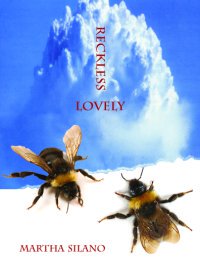Book Review
 In Martha Silano’s stunning fourth collection of poems, readers will encounter “velvety soup,” “60,000 eggs,” and “the big bang,” the end result being poems that are as wildly imaginative as they are diverse in their subject matter. While Silano certainly engages a wide range of ideas, the collection is unified by her ongoing interest in sound; she offers us poems that crackle, sizzle, and hum. What’s more, Silano subtly suggests that the sonic qualities inherent in language can contribute to a work’s semantic meaning, forging connections between ideas through alliteration, assonance, and consonance. As the book unfolds, Silano creates a space where multiple ways of creating meaning overlap and intersect, illuminating and complicating one another all the while.
In Martha Silano’s stunning fourth collection of poems, readers will encounter “velvety soup,” “60,000 eggs,” and “the big bang,” the end result being poems that are as wildly imaginative as they are diverse in their subject matter. While Silano certainly engages a wide range of ideas, the collection is unified by her ongoing interest in sound; she offers us poems that crackle, sizzle, and hum. What’s more, Silano subtly suggests that the sonic qualities inherent in language can contribute to a work’s semantic meaning, forging connections between ideas through alliteration, assonance, and consonance. As the book unfolds, Silano creates a space where multiple ways of creating meaning overlap and intersect, illuminating and complicating one another all the while.
What’s perhaps most compelling about Silano’s work is the way that she uses sound to render familiar grammatical constructions suddenly and wonderfully strange. Throughout Reckless Lovely, one will encounter pristine grammatical constructions, which frequently evoke a wide range of expectations on the part of the reader. We are led to believe that the semantic meaning of words will be privileged, that the sentences will progress in an orderly fashion, musicality being merely a welcome accident. Instead, readers will be delighted to discover that music, sound, and the texture of the words themselves propel the narrative forward. Consider this passage:
….After the foaming, beat in trilobites—
highly spiny, highly spiffy. After the rising,
serve on a place of sand where a horseshoe crab
exudes 60,000 eggs. With your baster, tickle
its tension, its pedipalps….
I find this passage fascinating in its pairing of unlikely ideas, images, and phrases. For example, “beat” and “trilobites,” “spiffy” and “spiny” seem at first conceptually disparate, yet at the same time, Silano’s brilliant repetition of similar sounds informs the reader that these words are intricately linked in both sound and meaning. Silano’s deft use of alliteration, assonance, and consonance imparts crucial information to the reader that’s not present in the narrative per se, allowing multiple types of meaning-making to work in concert. This strategy, wildly unexpected within such flawless grammatical and narrative constructions, proves to be a source of surprise and wonder throughout the book. In many ways, it is sound that allows contradictions to coexist gracefully within a familiar narrative space, the end result being poems that are as engaging as they are expansive in their approach to familiar linguistic structures.
Silano’s use of inherited forms proves equally impressive as the book unfolds. Frequently offering us sonically charged language within the confines of couplets, tercets, and quatrains, she creates a provocative tension between form and content. I’m fascinated by Silano’s ability to simultaneously inhabit and interrogate received form, as well as familiar narrative and grammatical structures. In many ways, Silano expands our sense of what is possible within these all too familiar frameworks for creating meaning. She writes, for instance, in “Wolves Keep in Touch by Howling”:
Listen! Do you hearthat?
That’s my tongue licking
a laceration, a bloody metacarpal,
a fracture; that’s my nasal baritone,
my UUUUUU unfurling your
foothold. Wolves keep in touch…
What’s most striking about this passage is Silano’s use of content to critique, comment on, and interrogate form. By creating a space in which the reader expects a clear narrative, exposition, and an orderly progression from one idea to the next, Silano is able to render the reader suddenly aware of the expectations they bring to certain forms, genres, and categories of writing. She resists this tendency to privilege the semantic meaning of words, the clear-cut relationship between signifier and signified, instead offering us a narrative that is as layered in meaning as it is rich in sound, texture, and music. With that in mind, Reckless Lovely is a beautifully crafted addition to Silano’s already accomplished body of work, a collection that is as conceptually astute as it is engaging.
About the Reviewer
Kristina Marie Darling is the author of over twenty collections of poetry and hybrid prose. Her awards include fellowships from Yaddo, the Ucross Foundation, the Helene Wurltizer Foundation, and the American Academy in Rome, as well as grants from the Kittredge Fund, the Elizabeth George Foundation, the Ora Lerman Trust, and the Rockefeller Foundation Archive Center. She is currently working toward both a Ph.D. in English Literature at S.U.N.Y.-Buffalo and an M.F.A. in Poetry at New York University.